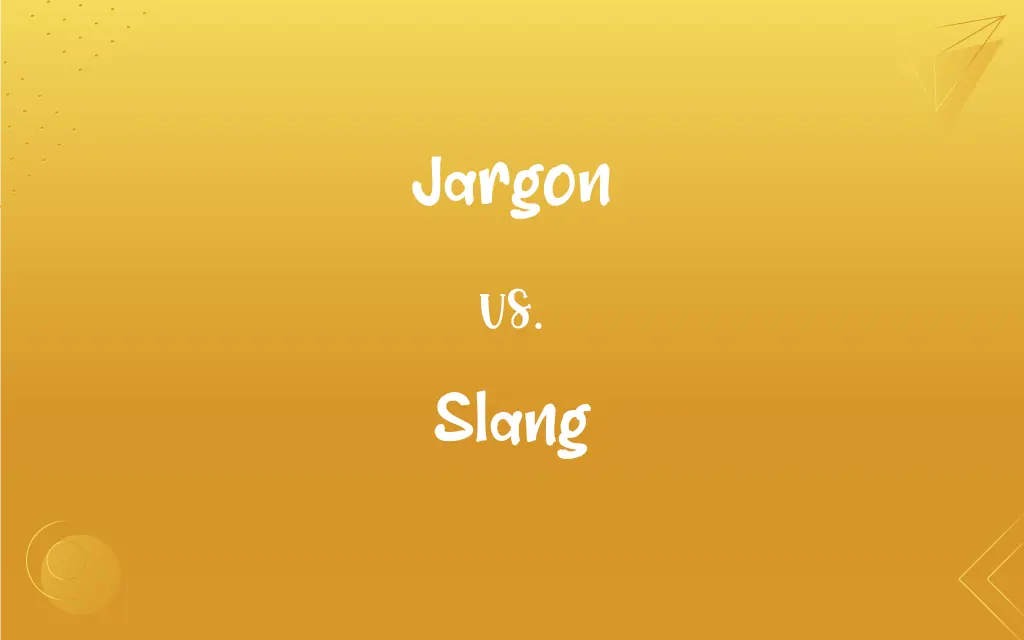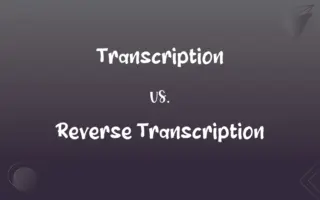Jargon vs. Slang: What's the Difference?
Edited by Aimie Carlson || By Harlon Moss || Updated on October 31, 2023
Jargon is specialized language used by professionals; slang is informal language used colloquially.

Key Differences
Jargon is a term that refers to specialized language or terminology used within a particular profession, industry, or group. It allows individuals within specific fields to communicate more efficiently and precisely. On the other hand, slang is a type of informal language that originates and evolves within social groups, often used as a way to fit in or to sound less formal.
Jargon often arises from the need to convey specific and technical information. It's common in professions like medicine, law, and technology. For instance, a doctor might use terms like "bradycardia" or "tachycardia" which mean slow or fast heartbeat, respectively. Conversely, slang words are born out of social interactions, and their meanings can change over time. For instance, "lit" once meant "intoxicated" but has evolved to mean "excellent" in recent years.
One notable characteristic of jargon is its constancy. While some jargon may become outdated, the terms generally remain consistent within their respective industries. Slang, in contrast, is much more fluid. What's considered popular slang today might be seen as outdated in a few years. For instance, terms like "groovy" from the 1960s are seldom used today in the same context.
Both jargon and slang serve important functions in language. Jargon provides a means for professionals to communicate with precision, ensuring that complex concepts are understood. Slang, meanwhile, facilitates informal communication, often forging or reflecting cultural identities and changes. It's worth noting, however, that while jargon is usually accepted and encouraged within its respective field, using slang in inappropriate settings can sometimes be viewed as unprofessional.
While jargon is restricted to those who belong to a particular profession or group, slang is more accessible and can be picked up by anyone. For instance, even if you're not a doctor, you might not know the meaning of medical jargon. However, you might still understand slang terms used by teenagers even if you aren't one.
ADVERTISEMENT
Comparison Chart
Purpose
Facilitates precision in professional communication.
Facilitates informal communication within social groups.
Origin
Arises from professional or industry needs.
Originates within social interactions and groups.
Stability
Relatively constant within its field.
Fluid and changes with trends.
Acceptability
Encouraged within its specific field.
Might be viewed as unprofessional in certain settings.
Accessibility
Restricted to those in the specific profession/group.
More universal, can be picked up by anyone.
ADVERTISEMENT
Jargon and Slang Definitions
Jargon
Words or phrases used by a specific industry, often hard for outsiders to understand.
APR is banking jargon for Annual Percentage Rate.
Slang
Colloquial terms not used in formal speech or writing.
He bailed on us is slang for he left us.
Jargon
A language form particular to a group, often used to exclude non-group members.
Medical jargon can be confusing to patients.
Slang
Non-standard language often arising from social interactions.
I'm feeling blue is slang for feeling sad.
Jargon
Specialized language used by a profession or group.
In legal jargon, tort refers to a civil wrong.
Slang
Expressions used informally, often specific to a certain era or group.
That's groovy! is a slang term from the 1960s.
Jargon
Terms that are used specifically within a certain field or industry.
In the film industry, B-roll is jargon for supplemental footage.
Slang
Informal language used by a particular group.
That movie was lit! is a slang expression meaning the movie was great.
Jargon
Terminology specific to a particular field or interest.
In computer jargon, RAM stands for Random Access Memory.
Slang
Casual language, often used to convey familiarity or shared understanding.
Wanna grab some grub? is slang for wanting to get some food.
Jargon
The specialized language of a trade, profession, or similar group, especially when viewed as difficult to understand by outsiders
A crime novel that uses a lot of police jargon.
Slang
A kind of language occurring chiefly in casual and playful speech, made up typically of coinages and figures of speech that are deliberately used in place of standard terms for added raciness, humor, irreverence, or other effect.
Jargon
Nonsensical or incoherent language
"Your description will be considered as mere jargon by every man of sense" (Alexander Hamilton).
Slang
Language peculiar to a group; argot or jargon
Thieves' slang.
FAQs
Why is jargon used?
Jargon facilitates precise communication within a particular field or profession.
What is slang?
Slang is informal language used colloquially within social groups.
Why might someone use slang?
Slang can convey familiarity, shared understanding, or cultural identity.
Where does slang originate?
Slang often originates within social interactions and groups.
Is slang less formal than standard language?
Yes, slang is considered informal language.
What is jargon?
Jargon is specialized language used by a specific profession or group.
Can jargon be considered slang?
No, jargon serves a professional purpose, while slang is informal.
Can slang change over time?
Yes, slang is fluid and can evolve with cultural trends.
Are acronyms considered jargon?
If they're specific to a profession or group and aid in specialized communication, yes.
Can using jargon outside its field be confusing?
Yes, jargon can be hard for outsiders to understand.
How can one learn jargon?
Immersion in the specific field or profession is the best way to learn jargon.
Why might slang be considered inappropriate in formal settings?
Slang is casual and might be viewed as unprofessional.
Is slang universal?
While some slang terms become widely known, many are specific to certain groups or regions.
How does jargon differ from technical terms?
While both are specialized, jargon is industry-specific, whereas technical terms might be understood more broadly.
Does jargon exclude or include people?
Jargon can inadvertently exclude those not in the field, but it includes and aids those within it.
Is all jargon universally known within its field?
Most professionals within a field will know its jargon, but it can vary by region or specialty.
Can a word start as slang and become standard language?
Yes, some slang words become widely accepted and enter standard language.
Do all languages have slang?
Yes, most languages develop their own informal slang terms.
Is it important to understand slang when learning a new language?
To fully engage with native speakers and understand informal interactions, yes.
Is jargon static or does it evolve?
While relatively constant, jargon can evolve as industries change.
About Author
Written by
Harlon MossHarlon is a seasoned quality moderator and accomplished content writer for Difference Wiki. An alumnus of the prestigious University of California, he earned his degree in Computer Science. Leveraging his academic background, Harlon brings a meticulous and informed perspective to his work, ensuring content accuracy and excellence.
Edited by
Aimie CarlsonAimie Carlson, holding a master's degree in English literature, is a fervent English language enthusiast. She lends her writing talents to Difference Wiki, a prominent website that specializes in comparisons, offering readers insightful analyses that both captivate and inform.
































































